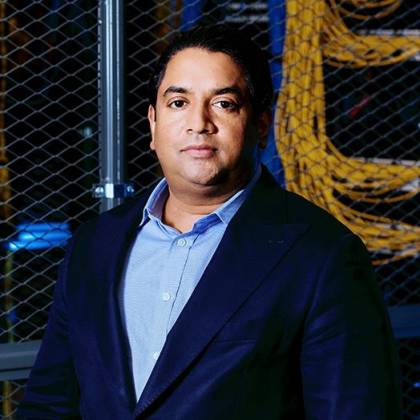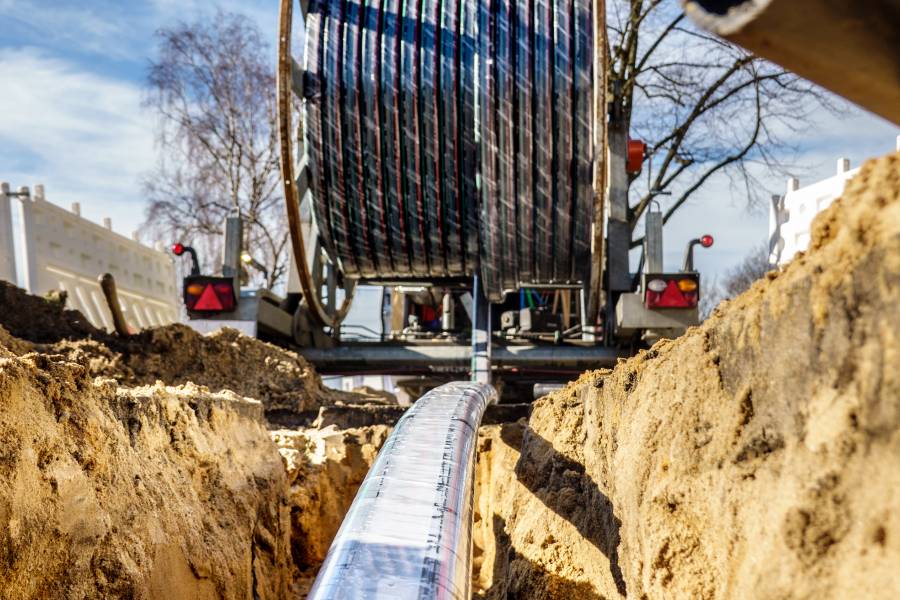For Veneeth Iyengar the past three years have been something of a homecoming.
Born and raised in Louisiana, he went to college in the Midwest before working in Southeast Asia, Washington, D.C., and Baltimore. Now executive director for broadband development and connectivity for the state of Louisiana, Iyengar is in his home state working to bridge the gap between issues of accessibility, affordability, and the economic need for connectivity in the digital age.
"Our first goal is to understand the depth and breadth of households in Louisiana considered unserved due to lack of broadband," said Iyengar, who received his master's degree in finance from the Johns Hopkins Carey Business School in 2011. "How many households can't afford it? How many adults lack the digital skills to move forward in a digital society? How do we allocate these pots of money coming from the federal government? How do we remove digital dive by 2029?"

Image caption: Veneeth Iyengar
According to Iyengar, 643,000 households in Louisiana, representing 1.6 million Louisianans, lack high speed internet either because of an access, device, affordability, or literacy issue.
"Our office's job is to bring all the parties together and help with a certain challenge and then bring the private sector and all stakeholders together to address the issue. There's not a one-size-fits-all solution across the state. What works in Northwest Louisiana is different than what works in Southwest Louisiana. That's a function of accessibility, infrastructure, and affordability," Iyengar said.
While issues of accessibility and affordability aren't new, Iyengar's office is—it was created by the governor in March. Iyengar refers to the office as a "startup" because he's charged with creating and fulfilling the mission.
Connectivity during COVID-19
The COVID-19 pandemic has exacerbated the existing inequities in broadband and connectivity issues. While Iyengar is acting quickly to get the office staffed and operational, he is working against the clock on issues like education, health care, agriculture, and more.
"There's been a rapid convergence between the importance of broadband and education," he said. "You've made this shift to adopt some aspect of virtual learning. In Louisiana, we have an acute teaching shortage. We are looking at solutions and asking, where can broadband play a role?"
In the pandemic, telehealth is booming and provides a safe option for high-quality care in both rural and urban areas. Iyengar is working to educate Louisianans, especially older residents unfamiliar with telehealth services, about the opportunities and benefits of digitally delivered care.
Educating Louisianians on the benefits is only part of the challenge. "You have to shift behaviors," Iyengar said.
And in agriculture, Iyengar is excited to see new opportunities to connect cell phones, farming equipment, and additional technology to garner more crop data and improve crop yield.
Iyengar acknowledges that success won't come overnight. He estimates it will take eight to nine years to chip away on the issues of accessibility, affordability, and education. But throughout that time, he is optimistic that creating disruptive growth models and continuing to foster public-private partnerships will make an impact.
Flexibility, listening, and solving problems
For Iyengar, he's able to pivot between the myriad of campaigns and issues that come across his desk because he sees himself primarily as a problem solver. He credits his career success to his flexibility and solution-oriented approach—skills he honed at Carey Business School.
"It's important to balance out the linearity of finance with the flexibility of your career and job scope. Independent of your discipline and what degree you earned, maintaining flexibility and, most importantly, solving people's problems, is the greatest way someone can generate change and move up in their career. If someone has a problem and you say my job is to solve that problem, you're going to go a long way. From a finance perspective, what are you trying to do? You're trying to use finance to solve problems," Iyengar said.
He emphasized listening as a key to finding lasting solutions.
"Being very deliberate and having listening skills is critical," Iyengar said. "Some of it is the environment you work in, if they allow you to really listen. Rather than forcing a solution, I spend a significant amount of time listening."
Posted in Alumni
Tagged alumni, coronavirus, covid-19








